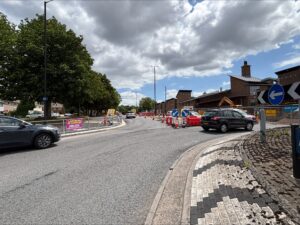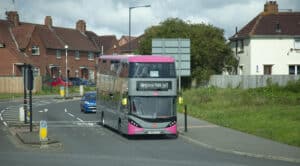
£3.5m boost for active travel across the region
£3.5m boost for active travel across the region
The West of England is set to invest a further £3.5 million in walking, cycling, and wheeling projects across the region.
Top line: Switching from private motor transport to active travel or public transport is associated with a significant reduction in weight. In contrast, switching from active travel or public transport to private motor transport is associated with a significant weight increase.
Previous research has charted how a shift in travel mode away from active travel is strongly associated with weight gain.1 Evidence for a reverse effect, that is, a change in mode from private motorised transport to active travel has been weak due to the study design of most papers which limits the potential for drawing reliable causal inferences. A 2015 longitudinal study has used a nationally representative data set – the British Household Panel Survey (BHPS)2 – to examine the impact on Body Mass Index (BMI) of switching between private motor transport and active travel or public transport for the journey to work.3 Thus, this study was able to examine the effect both of a switch to active modes from private motor transport (3269) or to private motorised transport from active travel modes (787).
The researchers observed that switching from private motor transport to active travel or public transport was associated with a reduction in BMI, even in a relatively short-time period of under 2 years. This suggests that a shift in the proportion of commuters using more active modes of travel could contribute to efforts to reduce the population’s average BMI. Combined with other potential health, economic and environmental benefits associated with walking, cycling and public transport, these findings add to the case for interventions to promote the uptake of these more sustainable forms of transport. If large numbers of people could be enabled to take up active travel to work, for example through environmental and policy interventions in the transport and planning sectors, the benefits for population health may be larger than those of alternative interventions targeted at producing larger individual health benefits for relatively small numbers of people.
The finding that participants who switched to active travel were, on average, from lower income households, less likely to be educated to degree-level or higher and more likely to work part-time than other participants in the study could be indicative of the potential for interventions in the transport and planning sectors to support strategies to reduce health inequalities.
The significant association observed between change in BMI and switching from private motor transport to active travel or public transport supports the implications of existing studies showing that public transport users can achieve significant levels of physical activity when accessing stations or stops.4
1 See Essential Evidence issues 7 & 58 www.travelwest.info/evidence
2 The BHPS is a longitudinal study of private households in Great Britain that began in 1991/1992 as an annual survey of each adult member of a nationally representative sample of households. BHPS after 2008/2009 are encompassed in the new ‘Understanding Society’ survey, http://www.iser.essex.ac.uk/survey/bhps
3 Martin, A., Panter, J., Suhrcke, M., Ogilvie, D. 2015 Impact of changes in mode of travel to work on changes in body mass index: evidence from the British Household Panel Survey, Journal of Epidemiology and Community Health, 0:1-9. doi:10.1136/jech-2014-205211
4 See Essential Evidence 28 www.travelwest.info/evidence

The West of England is set to invest a further £3.5 million in walking, cycling, and wheeling projects across the region.

Work to rebuild the southbound section of Passage Road (A4018), between Crow Lane roundabout and Charlton Road, is taking place from 14 July to 1 August 2025.

Plans to extend the metrobus m1 service in the south of the city have been given the go-ahead by members of the Transport and Connectivity Committee when they met on Thursday 10 July.
A major scheme to improve the condition and safety of roads in Congresbury begins on Monday 14 July.
Work to cut back Willow trees on Herluin Way in Weston-super-Mare begins on Tuesday 15 July.